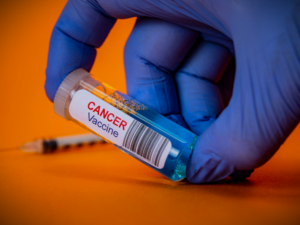In recent years, the world of cancer treatment has been buzzing with excitement over a groundbreaking development: cancer vaccines. These vaccines, designed to prevent or treat cancer, are poised to revolutionize the way we fight one of the deadliest diseases of our time. But how do they work, and why are they making headlines today? Let’s explore this promising new frontier in cancer research.
What Are Cancer Vaccines?
Cancer vaccines are a type of immunotherapy that work by stimulating the body’s immune system to recognize and fight cancer cells. Unlike traditional vaccines, which prevent infections, cancer vaccines are tailored to help the immune system target and destroy cancer cells that are already present in the body. There are two main types of cancer vaccines: preventive and therapeutic.
- Preventive Cancer Vaccines: These vaccines are designed to prevent cancer from developing in the first place. They target viruses or bacteria that are known to cause cancer. A well-known example is the HPV vaccine, which prevents infection from the human papillomavirus, a leading cause of cervical, anal, and other cancers.
- Therapeutic Cancer Vaccines: These vaccines are used to treat cancer by stimulating the immune system to attack cancer cells. They don’t prevent cancer but can help slow its growth or even shrink tumors. Therapeutic vaccines are being developed for various types of cancer, including melanoma, prostate cancer, and breast cancer.
Why Cancer Vaccines Are Making Headlines Today
Several factors have combined to bring cancer vaccines to the forefront of cancer treatment news:
1. Advances in Immunotherapy
Over the past decade, immunotherapy has emerged as one of the most promising approaches to cancer treatment. This treatment boosts the body’s immune system to fight cancer, and cancer vaccines are a key component of this strategy. As researchers continue to uncover new ways to harness the immune system’s power, cancer vaccines are becoming a more viable and effective option.
2. Breakthroughs in Vaccine Development
Recent clinical trials have shown encouraging results, making cancer vaccines a hot topic in medical research. For example, the development of the melanoma vaccine has shown success in shrinking tumors and improving patient survival rates. Other vaccines targeting specific cancers are also making significant progress in clinical trials.
3. Personalized Medicine
The growing trend of personalized or precision medicine is another reason why cancer vaccines are making headlines. Scientists are now able to develop vaccines tailored to an individual’s unique genetic profile, ensuring that the vaccine is as effective as possible for that person’s specific type of cancer. This personalized approach promises more targeted treatments with fewer side effects.
4. FDA Approvals and Approvals in the Pipeline
The FDA’s approval of the HPV vaccine for cancer prevention was a major milestone, and now other cancer vaccines are making their way through clinical trials and regulatory processes. The news that some of these vaccines are nearing FDA approval has brought even more attention to the field. Companies like Moderna, famous for its COVID-19 vaccine, are also working on cancer vaccines, further fueling interest in this area.
How Cancer Vaccines Work?
Cancer vaccines work by targeting specific molecules found on the surface of cancer cells. These molecules, called antigens, are unique to cancer cells, allowing the immune system to distinguish between healthy and cancerous cells. Once the vaccine is administered, it trains the immune system to recognize these antigens and destroy the cancer cells that express them.
For example, in the case of melanoma (a type of skin cancer), researchers have developed vaccines that target specific proteins found on melanoma cells. Once the immune system is trained to recognize these proteins, it can attack melanoma cells even if they spread throughout the body.
Key Developments in Cancer Vaccine Research
Some of the most exciting developments in cancer vaccine research today include:
1. Moderna’s mRNA Cancer Vaccine
Following the success of the mRNA COVID-19 vaccine, Moderna is now working on mRNA-based cancer vaccines. These vaccines work by instructing cells to produce proteins that mimic those found on cancer cells. The immune system is then trained to target and destroy these cells. Moderna has already begun clinical trials for cancer vaccines targeting melanoma and other cancers.
2. Pan-Cancer Vaccines
Scientists are also working on vaccines that target multiple types of cancer simultaneously. These pan-cancer vaccines are designed to stimulate the immune system to recognize common cancer antigens that are present across many different types of cancer. If successful, these vaccines could help treat a wide range of cancers with a single treatment.
3. Combination Therapies
Cancer vaccines are increasingly being tested in combination with other treatments, such as chemotherapy, radiation, and targeted therapy. Researchers believe that using cancer vaccines in conjunction with these treatments may improve their effectiveness and help prevent cancer recurrence.
The Challenges Ahead
While the potential for cancer vaccines is enormous, there are still challenges to overcome. Developing a vaccine that works for every patient is a difficult task, as cancer cells can vary greatly between individuals. Furthermore, cancers are known to evolve and change, which means that the vaccines may need to be continually adjusted.
Another hurdle is the cost and accessibility of cancer vaccines. While there has been significant progress in the development of these vaccines, widespread access and affordability remain key concerns.
The Future of Cancer Vaccines
Looking ahead, cancer vaccines have the potential to become a cornerstone of cancer treatment. As research continues to advance, we may see vaccines that not only prevent cancer but also provide effective treatments for those already diagnosed. By combining vaccines with other forms of immunotherapy, scientists hope to create more powerful treatments that could ultimately save lives.
With ongoing advancements in genetic research, personalized medicine, and immunotherapy, the future of cancer vaccines looks bright. The combination of scientific innovation and clinical breakthroughs has brought us closer to a world where cancer is no longer a death sentence, but a treatable, manageable condition.
Conclusion
Cancer vaccines are undoubtedly making headlines today, thanks to remarkable advancements in immunotherapy, vaccine development, and personalized medicine. As clinical trials continue to show promise, cancer vaccines hold the potential to transform the way we prevent and treat cancer. While there are still challenges to overcome, the future of cancer treatment looks more hopeful than ever, offering new hope for patients and their families. The headlines today may be just the beginning of a new era in the fight against cancer.



